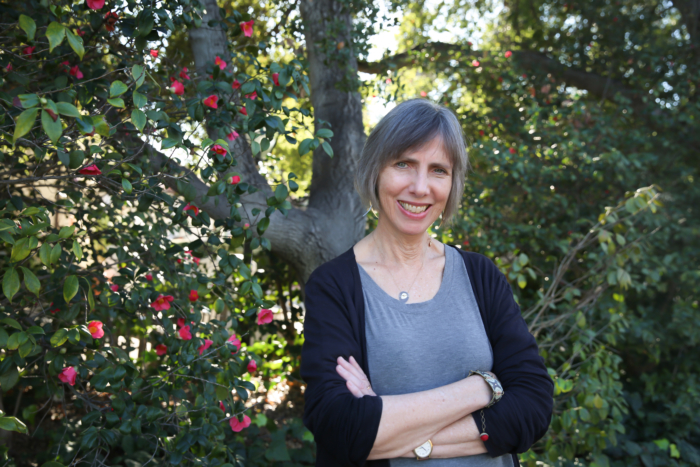
When I sit down in the leather armchair in Sue Castagnetto’s office, I’m immediately struck by her calm and welcoming presence. Castagnetto, who serves as the director of the Intercollegiate Feminist Center (IFC) and is a lecturer in the philosophy department at Scripps, has led the IFC for the past 18 years. Her wealth of knowledge is reflected in the stacks of papers and books that overflow around us. Castagnetto’s personal work centers on the intersection between philosophy and gender and women’s studies, with a focus on criminal justice and the challenges of incarcerated women. As the head of the IFC, Castagnetto ensures that the center’s work is grounded not only in The Claremont Colleges, but that it engages the greater community as well.
Morgan Albrecht: What does your role as director of the IFC entail?
Sue Castegnetto: I take the lead on developing IFC programs and projects and securing resources to support them. We have a 6C faculty steering committee that I chair, and I work with the committee on IFC programs. I also do outreach to the women’s/gender studies programs and faculty at the colleges, to feminist student groups on campus, and to the community. I also serve on committees whose work is related to gender studies and diversity. Additionally, I teach two classes each year—one at Scripps and one at Pomona—on philosophy and gender studies topics.
MA: With an academic background in philosophy, what initially sparked your interest in feminist, gender, and sexuality studies?
SC: Many years ago, I was asked to teach a course on philosophy of feminism at Scripps as part of a postdoc I had at Claremont Graduate School (now Claremont Graduate University). I had no idea of what such a course would look like, but developed it with the advice of my graduate school advisor. I found that I loved it, and I began teaching it regularly. I’ve since developed other philosophy courses on gender issues.
I have always been interested in questions of free will and responsibility. My interest in prisons came from that—observing how our reasons for punishing people often are inconsistent, irrational, or counterproductive—and I now teach a course on women, crime, and punishment.
MA: Can you speak a bit more about the crossover between your academic interests and what the Intercollegiate Feminist Center does?
SC: I’m a philosopher, so my teaching and interests are along philosophical lines, but I’m also interested in bringing theory and practice together, and the IFC provides opportunities for developing projects that do that. For instance, during my first year in this position, we sponsored a conference called “Women, Prisons, and Criminal Injustice.” The conference brought together scholars, advocates, and formerly incarcerated women with a focus on injustices facing women in the prison system and how to make change. Before that, I hadn’t known much about women in prison. The conference led to our doing other justice-related programs and to making connections with various community organizations and the local state women’s prison. That, in turn, led to developing an ongoing series of writing workshops at the women’s prison that students also attend. I am currently working with an intercollegiate group on developing justice education projects at The Claremont Colleges, including teaching Claremont colleges courses in local prisons.
MA: The IFC has partnered with a number of community organizations over the years. Could you tell us more about what this means to you?
SC: I value being able to contribute to making positive social change. Teaching and raising awareness of social justice issues through IFC programs does that, of course, but having opportunities to bring my academic skills and knowledge to community-based work is especially rewarding.
One particularly interesting project for me was spending a year as a fellow in the Women’s Policy Institute, a project sponsored by the Women’s Foundation of California that trains women leaders to do policy work. I was in a cohort of other women in criminal justice advocacy that developed and passed a piece of state legislation. It was a phenomenal experience—not only did I learn an enormous amount about policymaking, but I also developed a large network of people and organizations doing work related to the wellbeing of women and girls in California. We’ve brought some from this network to the colleges as speakers and have co-sponsored symposia and conferences with others. I also think it’s important that students have the opportunity to see how their academic work connects with making real-world change. Learning from those who do this change-making work is an invaluable part of education.
MA: Is there a fact about yourself that is surprising, or that people don’t know about, that you’d like to share?
SC: I am adopted, and in the last 15 years or so I’ve also gotten involved in adoption-related projects. I’ve met many others in the adoption triad and have done some work on adoption policy. I brought the Alliance for the Study of Adoption and Culture’s 2012 conference, “Mapping Adoption: Histories, Literatures, Geographies, Politics,” to Scripps; it was a three-day international conference that IFC took the lead on organizing.
And, perhaps not surprising, a big part of my life is my family: I have two children, both now graduated from college. One works in the Bay Area for the Silicon Valley Community Foundation, and the other just started law school at Penn. My husband teaches at Pomona.

